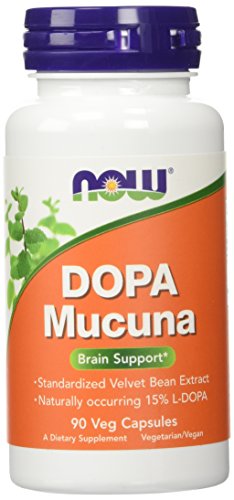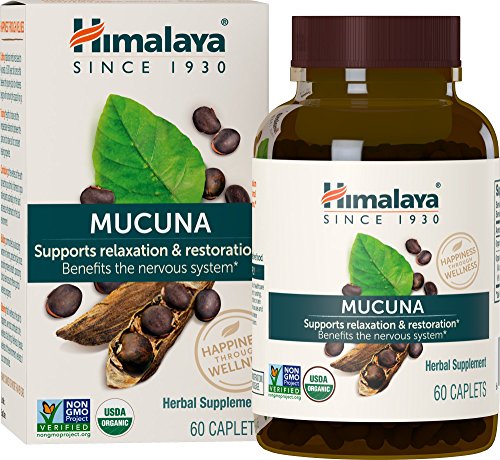People say that each herb in traditional Indian medicine has its magic and determines its effect on the body. Some of these herbs are proved in modern medicine; others are still the result of myths and legends.
One of these herbs is Mucuna pruriens. In addition to its properties, known for centuries, Mucuna pruriens are one of the few herbs which are successfully used in medicine.
Mucuna is a plant that grows on the territory of India, the Caribbean, and some parts of Africa. Mucuna pruriens are one of the few herbs which are successfully used in medicine.
Mucuna pruriens contains high concentrations of nicotinic acid (vitamin B-3), serotonin and 5-HTP, coenzyme Q10, adrenaline, beta-carboline, inositol, and small amounts of basic minerals, such as selenium, iron, and magnesium.
A number of in-vitro and in vivo studies have found the powerful influence of Mucuna pruriens on the body. The herb may possess strong anti-inflammatory, anti-diabetic, antioxidant and neuroprotective properties that are almost entirely attributable to L-DOPA.
The fact that Mucuna is the richest source of L-DOPA in nature is the reason why the plant should be subjected to such detailed research.
Top 5 Mucuna Supplements
Product | Name | Buy on iHerb | Buy on Amazon |
|---|---|---|---|
#1 Now Foods Dopa Mucuna | |||
#2 Source Naturals Mucuna Dopa | |||
#3 Himalaya Mucuna | |||
#4 Solaray DopaBean | |||
#5 Paradise Herbs Mucuna |
What Is Mucuna Pruriens
Mucuna is a plant that grows on the territory of India, the Caribbean, and some parts of Africa. Mucuna is a climbing shrub that has the ability to grow white, lavender, or purple flowers.
The plant can reach 15 meters in height. The colors have a protective mechanism and cause itching on bare skin, due to the mucunain alkaloid.
Mucuna has a high content of micronutrients and macronutrients and thus has a caloric content. Beans of the plant contain up to 30% protein and calorie content is between 11% and 23% of the entire protein mass.
The beans have high fiber content - up to 40% of the total mass. The dried beans have a higher protein content which may reach up to 35%. Besides proteins and fibers, Mucuna pruriens is also rich in fat, predominantly essential fatty acids, such as oleic and linoleic acids.
Chemical analysis shows that, like many other exotic plants, Mucuna pruriens has a high antioxidant activity due to the many phytochemicals. The main antioxidants are phenols and glycosides.
The main active ingredient in the beans is the phenol component L-DOPA, which comprises from 5 to 20% of the extracted content. Other major components are indoles and alkaloids. The beans contain 4 identified alkaloids.
Mucuna pruriens contains high concentrations of nicotinic acid (vitamin B-3), serotonin and 5-HTP, coenzyme Q10, adrenaline, beta-carboline, inositol, and small amounts of basic minerals, such as selenium, iron, and magnesium.
Mucuna also contains high concentrations of tannins (polyphenols) which have the potential to block the degradation properties of proteins. Other potentially unwanted components are cyanogenic glycosides that are toxic to the human body.
It is interesting to note that the leaves of Mucuna contain high concentrations of tryptamine components, which are hallucinogens but are not present in the commonly used beans.
How Does Mucuna Pruriens Work
A number of in-vitro and in vivo studies have found the powerful influence of Mucuna pruriens on the body.
The herb may possess strong anti-inflammatory, anti-diabetic, antioxidant and neuroprotective properties that are almost entirely attributable to L-DOPA.
The fact that Mucuna is the richest source of L-DOPA in nature is the reason why the plant should be subjected to such detailed research.
L-DOPA works not only individually, but also in interaction with other active substances in the composition of Mucuna pruriens, as indoles and tetrahydroisoquinoline alkaloids.
They improve antioxidants properties. On the other hand, long-term use of L-DOPA in neurodegenerative diseases can exhibit the opposite effect, such as DNA damage and reduction of the reduced glutathione.
This may be due to the increased synthesis of the reactive substance of L-DOPA. Nowadays L-DOPA (Levodopa) is increased compared to the Mucuna pruriens extract.
Levodopa is preferable because it is composed of one molecule and it is easy to be examined, but it has side effects that are not typical of Mucuna pruriens.
It has been found that Levodopa increases DNA damage via copper ions in the brain while this effect is avoided by Mucuna because its properties to bond with metals. The antioxidant properties of natural L-DOPA have an additional protective effect.
One of the few comparative studies in humans has demonstrated that L-DOPA by Mucuna is 2-3 times more potent than the isolated Levodopa and does not cause side effects such as dyskinesia (folding of the gallbladder).
The half-life of L-DOPA in the human body is only about one astronomical hour. It was found that heat treatment impairs many of the trace elements in the Mucuna pruriens, including enzymes.
The plant, however, is very vulnerable to sodium bicarbonate, which dramatically reduces any trace elements, and greatly affects Levodopa.
Usage In Traditional Medicine
Mucuna pruriens has been used to treat Parkinson's disease and other neurological diseases way back in traditional Indian medicine. The herb has been used widely as a sexual stimulant, as well as for the treatment of arthritis.
Healers have used Mucuna pruriens decoction to treat the wounds of a scorpion or snake bites. Practitioners have used to put Mucuna of the sting of a scorpion in order to neutralize the poison before getting into the blood.
Mucuna has been used also to enrich the soil and also as an insecticide. Indian mountain tribes have boiled the herb several times to remove potential toxins and to then use it as a fertilizer.
The traditional use of Mucuna is associated with antimicrobial and anti-inflammatory properties. Some tribes used dry Mucuna extract for smoking.
Potential and Proven Benefits:
- Mucuna has potential properties to increase sperm in men by the impact on the hypothalamus-pituitary gland - testis;
- Mucuna enhances sperm quality and fertility;
- Ability to lower prolactin levels, as it is responsible for dopamine, which affects the secretion of prolactin;
- L-DOPA increases the levels of certain neurotransmitters such as dopamine, adrenaline, and noradrenaline. It is noted that Mucuna restores reduced levels of these neurotransmitters in infertile men. Healthy men also experienced stimulation, particularly of dopamine levels;
- Potential benefits associated with reducing the symptoms of Parkinson's disease. There are several studies that use a daily dose between 15 and 30 grams. The positive effect is associated with the recovery of the levels of L-DOPA in the brain and effects on peripheral dopamine decarboxylase inhibitor;
- Potential benefits associated with the regulation of stress and improving mood. The mechanism of action is related to the effects on dopamine and regulation of cortisol;
- Potential benefits associated with the increase in growth hormone. So far there is only a positive study that tested using 500 mg of L-DOPA isolated daily. Given that L-DOPA is potent, the equivalent intake would have similar results;
- It is estimated that Mucuna has a beneficial effect on keratinocytes and helps strengthen skin damages, caused by intense oxidative stress. These properties would be useful in diseases such as eczema, dermatitis, and psoriasis;
Side Effects:
As already mentioned, Mucuna contains high doses of cyanogenic glycosides that have a strong toxic effect on the body and may cause chronic or acute intoxication.
Therefore, it is mandatory not to exceed the recommended doses and not to risk long-term intake.
- Despite the potential intoxication, human studies indicate no serious side effects, even with an intake of 15-20 grams per day for 20 weeks.
- A small part of the test subjects has complained about nausea and vomiting, which was due to digestion factors, not to the bioactivity of Mucuna pruriens.
- Mucuna contains many toxic and anti-physiological elements that may decrease the absorption of nutrients not only from the herb but also from other food, taken together with the herb.
- An inappropriate extract of the plant Mucuna pruriens (which have high concentrations of tannins) may suppress antioxidant activity rather than stimulate it.
- Mucuna can create problems with the absorption of minerals such as zinc and magnesium due to the high content of phytates.
- Mucuna pruriens is not recommended for pregnant women, breastfeeding mothers, and children.
- Mucuna is not recommended to people with low blood sugar and mental illness due to possible complications.
Recommended Doses
The dose depends on whether you consume Mucuna extract or Mucuna powder. The recommended dose (powder from the dried bean is up to 5 grams a day, although doses up to 15-30 grams per day have not demonstrated serious side effects.
If you consume the extract, you should pay attention to the L-DOPA percentage concentration, which varies between 5 and 25%.
Various studies have used between 100 and 800 mg L-DOPA day, isolated Levodopa, which is 2-3 times less than the equivalent in Mucuna pruriens. People are recommended to comply with the instructions of the manufacturer in all cases.
How to Combine Mucuna Pruriens
Mucuna pruriens can be used as a brain stimulator and for reducing symptoms of Parkinson's disease.
In this case, an appropriate combination of the herb is with other proven agents, such as the combination of acetyl-L-carnitine and alpha-lipoic acid, or Alpha-GPC. Taken before bedtime, Mucuna is associated with the nighttime recovery and sleep quality.
A successful combination is with GABA and Alpha-GPC. Some studies demonstrate the potential benefits of the hormonal balance in men.
If your target is to regulate testosterone, D-aspartic acid, Tribulus Terrestris and zinc would be an appropriate addition.






